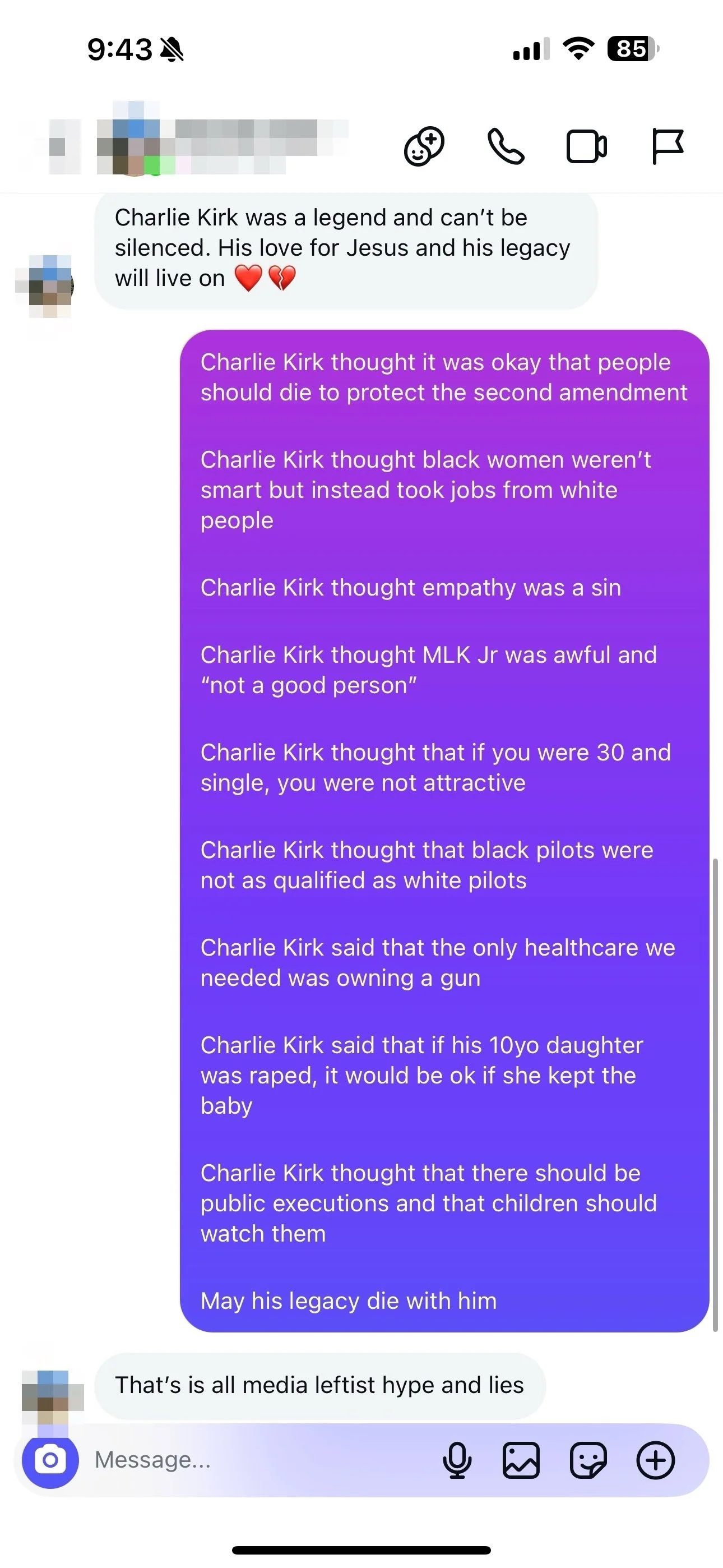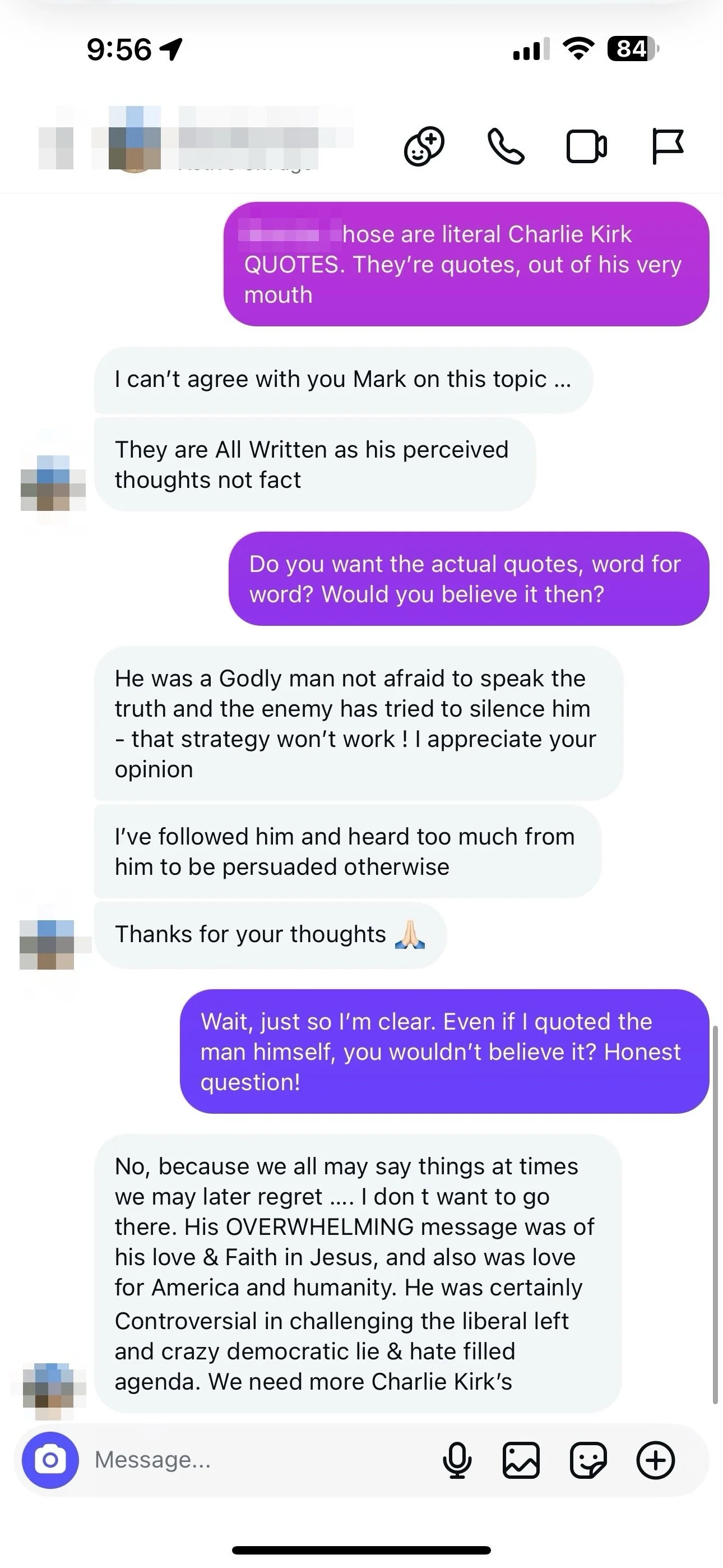Charlie Kirk and Confirmation Bias
When Believing is Seeing, We Make Bad Choices
Since Charlie Kirk was killed by a 22-year-old kid in Utah on September 10, the internet has been at each other’s throats. “How could you speak ill of the dead” people have been speaking ill of “But have you heard the things he said?” people.
It’s been a mess.
Before I get any further, I need to be clear: I am in the second group. I will never celebrate the murder (extrajudicial or judicial) of anybody. Ever. At the same time, Kirk’s words were hateful and inflammatory.
And I also have dear, dear friends in my inbox telling me that even quoting those words is somehow speaking badly of a man who can no longer defend himself.
There’s one specific conversation I haven’t stopped thinking about. It was with someone I’ve known for nearly two decades. Here are screenshots of the start of the conversation, with identifying information censored. (A transcript of the conversation follows the screenshots)
Transcript (with minor spelling and grammar corrections) below
Friend: Charlie Kirk was a legend and can’t be silenced. His love for Jesus and his legacy will live on ❤️💔
Me: Charlie Kirk thought it was okay that people should die to protect the second amendment. Charlie Kirk thought Black women weren’t smart but instead took jobs from white people. Charlie Kirk thought empathy was a sin. Charlie Kirk thought MLK Jr was awful and “not a good person.” Charlie Kirk thought that if you were 30 and single, you were not attractive. Charlie Kirk thought that Black pilots were not as qualified as white pilots. Charlie Kirk said that the only healthcare we needed was owning a gun. Charlie Kirk said that if his 10yo daughter was raped, it would be ok if she kept the baby. Charlie Kirk thought there should be public executions and that children should watch them. May his legacy die with him.
<I warned you…I’m not a fan of Kirk’s>
Friend: That is all media leftist hype and lies
Me: Those are literal Charlie Kirk quotes. They’re quotes, out of his very mouth.
Friend: I can’t agree with you Mark on this topic… They are all written as his perceived thoughts not fact
Me: Do you want the actual quotes, word for word? Would you believe it then?
Friend: He was a Godly man, not afraid to speak the truth, and the enemy has tried to silence him—that strategy won’t work! I appreciate your opinion. I’ve followed him and heard too much from him to be persuaded otherwise. Thanks for your thoughts 🙏
Me: Wait, just so I’m clear. Even if I quoted the man himself, you wouldn’t believe it? Honest question!
Friend: No, because we all may say things at times we may later regret… I don’t want to go there. His overwhelming message was of his love and faith in Jesus, and also was love for America and humanity. He was certainly controversial in challenging the liberal left and crazy democratic lie and hate-filled agenda. We need more Charlie Kirks
The conversation continued for a bit longer. We covered Gaza (“I’m utterly pro-Israel…don’t mind nailing my color to the mast”) and Melissa Hortman, the Speaker of the House in Minnesota who was assassinated three months before Kirk.
On the latter, I asked my friend if they found it strange that President Trump had ordered flags to be flown at half-staff to honor an assassinated influencer, but not an actual politician.
My friend said, “I am definitely pro-Trump. There’s no denying in my mind Charles Kirk’s influence and impact extended far beyond the reach of Hortman. We can’t fly the flag at half-mast for everyone, so I see why Trump has done that — YES!”
Depending on what side of the Charlie Kirk story you are, it’s very easy to read this interchange with a certain dismissal of the other side. How, for example, could my friend so easily say that not even direct quotes would change their mind?
Or, on the other hand, how could I not concede their point that Hortman’s influence was smaller than Kirk’s?
Welcome to confirmation bias.
Believing is Seeing: Breaking Confirmation Bias
My friend’s response to the offer of direct quotes is, in my opinion, one of the clearest articulations of confirmation bias I’ve ever seen:
“No,” they said, “because we all may say things at times we may later regret… I don’t want to go there. His overwhelming message was of his love and faith in Jesus, and also was love for America and humanity. He was certainly controversial in challenging the liberal left and crazy democratic lie and hate-filled agenda. We need more Charlie Kirks.”
Confirmation bias is arguably the most well-known of the mental biases we all have. It’s the bias that causes us, unintentionally, “to process information by looking for, or interpreting, information that is consistent with their existing beliefs…. It results in a person ignoring information that is inconsistent with their beliefs.”
Before talking about countering it, there’s something I need us all to acknowledge. Confirmation bias is not limited to people confirming the “wrong” beliefs.
In a cool study back in 2023, Eugene Malthous presented nearly 4000 people the results of a completely made-up study on vaccine efficacy. Some people saw results that “proved” that vaccines were ineffective, and some that “proved” the opposite. Again, totally made-up results.
He showed that confirmation bias was not just the purview of the anti-vaxxers. The folks who held the (correct) belief that vaccines are safe and effective also minimized any findings to the contrary.
In other words, while it might be super easy to view my friend’s confirmation bias as some indicator of their intelligence, character, correct or incorrect view of the world, that would be wrong.
They’re not brainwashed, silly, or misinformed. They’re deeply human.
And the literature also bears that out. Physicians think their physician colleagues are more susceptible to confirmation bias (78%) than they themselves are (52%).
…Which is also a confirmation bias.
Source: Lazycreekimages on Unsplash
Breaking Confirmation Bias
So, what can you do? How do you break confirmation bias in yourself, or in someone who doesn’t even see that they’re doing it?
Disappointingly, this bias is a particularly trenchant one. There is far more literature out there on describing it than there is on counteracting it.
And, equally disappointingly, most of the suggested strategies are long and slow: consider better media literacy education; or structured evaluations; or decreasing reliance on memory; and so on.
Which is probably why I was also out of my depth when my friend countered my suggestion of more information with their flag-planting. No matter what information I showed them, they would never not believe that Kirk was a Jesus-fearing Christian and a deeply good man.
And I had no idea how to move next.
After all, I couldn’t be like, “Friend, maybe you should consider enrolling yourself in a media literacy course. Cool? Good talk!”
I did, however, find this deeply fascinating master’s thesis by Rebecca Griffith. Griffith’s focus was on confirmation bias in forensic investigations.
She was particularly interested in a strategy called “consider the opposite” among her participants, all of whom were forensic physicians. In a CTO exercise, once a physician makes a determination, they are asked to consider—systematically—that they might have been wrong. To quote Griffith:
In this approach, the decision maker considers and lists the reasons their initial decision may be wrong. Lord, Lepper, and Preston (1984) found that explicitly telling participants to consider-the-opposite about a person they were evaluating had a significant effect on personality impressions.
(emphasis mine)
And her research bore that out. After demonstrating that the physicians in her sample preferred confirmatory information over disconfirmatory information, she asked one group of her participants to do a CTO exercise. She found that, compared to a control group, the group that stopped and explicitly wrote out the reasons their conclusion might be wrong showed a huge (and statistically significant) decrease in how highly they rated confirmatory information—in other words, a decrease in confirmation bias.
(Interestingly, the CTO exercise didn’t change how much these physicians disliked contradictory information. In other words, it made them more measured at taking confirmatory information at face value, but they still hated hearing that they were wrong.)
A strong effect? Maybe not.
But it’s definitely worth testing.
Try it out on yourself! How? Well, notice how incredibly easy it is to pick apart a news article about something you disagree with? Notice how you find all the holes?
Flip that script. The next time you read a news article that confirms something you believe, pick that one apart. Write out all the reasons that confirmatory piece of information might be wrong.
And if—and only if—your friendship with someone is strong enough, try asking them to do the same thing.
It may not fully break confirmation bias, but it might just get them thinking.
And that? That’s a very good thing.
Is confirmation bias keeping you stuck with decisions you made 20 years ago that no longer serve you? Let’s work together on getting you out. Here’s how:
→ Check out my online courses and coaching here. They range from 4 weeks to a year, and they take you from “what the heck do I do next” all the way to clarity and a step-by-step plan that honors both your calling and your right to thrive. Click here to apply!
→ Want more weekly content about making hard decisions with confidence and clarity? Join my mailing list!



